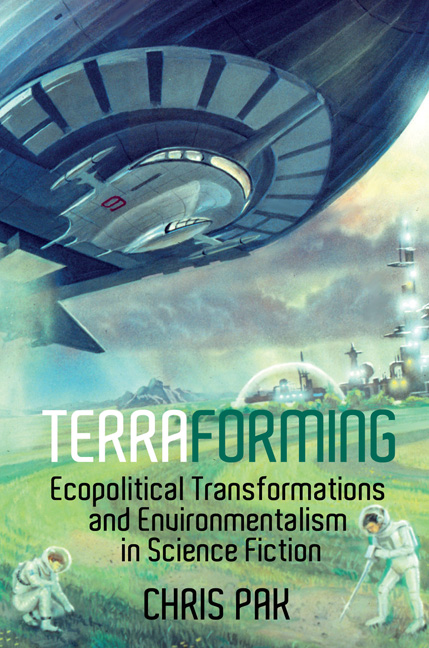Book contents
- Frontmatter
- Dedication
- Contents
- Acknowledgements
- Introduction: Terraforming: Engineering Imaginary Environments
- 1 Landscaping Nature's Otherness in Pre-1960s Terraforming and Proto-Gaian Stories
- 2 The American Pastoral and the Conquest of Space
- 3 Ecology and Environmental Awareness in 1960s–1970s Terraforming Stories
- 4 Edging Towards an Eco-cosmopolitan Vision
- 5 Kim Stanley Robinson's Mars Trilogy
- Conclusion
- Works Cited
- Index
Conclusion
- Frontmatter
- Dedication
- Contents
- Acknowledgements
- Introduction: Terraforming: Engineering Imaginary Environments
- 1 Landscaping Nature's Otherness in Pre-1960s Terraforming and Proto-Gaian Stories
- 2 The American Pastoral and the Conquest of Space
- 3 Ecology and Environmental Awareness in 1960s–1970s Terraforming Stories
- 4 Edging Towards an Eco-cosmopolitan Vision
- 5 Kim Stanley Robinson's Mars Trilogy
- Conclusion
- Works Cited
- Index
Summary
Narratives in the terraforming tradition contribute to a polyphony of worldviews about society and its ideal relationship to its environment and to nature. Landscaping processes act as interfaces for this preoccupation with society and with the relationship between the human and non-human. The pastoral, utopian discourse, ecology and environmentalism, along with elements of the sf megatext, have fed into the structure of terraforming narratives and shaped their thematic engagements. The megatext that the terraforming tradition constructs is Bakhtinian in its propensity to interrelate multiple texts and voices within the textual space of the terraformed world. The process of world-building that the terraforming narrative enacts provides a forum for philosophical, socio-cultural and political enquiry that is ecological in character. Drawing from the insights of James Lovelock's Gaia hypothesis since the 1980s, terraforming has become a primary motif for environmental and ecological thought in sf discourse. At the level of discourse, these stories re-use narrative elements and tropes developed by earlier texts, sometimes recycling these elements but also transforming them into new engagements with contemporary social and ecological anxieties.
This book has shown how the development of the idea of terraforming first arose within sf discourse before influencing scientific speculation about the future and environmental philosophical thought during a period of anxiety about climate change. This influence generated a feedback loop between sf, science and environmental philosophy, which helped shape the development of a narrative that could provide fertile ground for engagement with contemporary environmental concerns. Chapter one demonstrates how the first terraforming and proto-Gaian narratives can be read against environmental philosophical themes such as landscaping and establishes the relationship between nature's otherness and the representation of alien environments and organisms in sf. Chapter two analyses the influence of the American pastoral in the terraforming narratives of the 1950s boom and draws connections between landscaping processes, Bakhtin's chronotope and the sf megatext. Chapter three explores the influence of the burgeoning environmental movement on the development of representations of terraforming in the period 1960–1970, while chapter four considers how terraforming was consolidated and grew more sophisticated in its representation in the works of the 1980s.
- Type
- Chapter
- Information
- Publisher: Liverpool University PressPrint publication year: 2016



